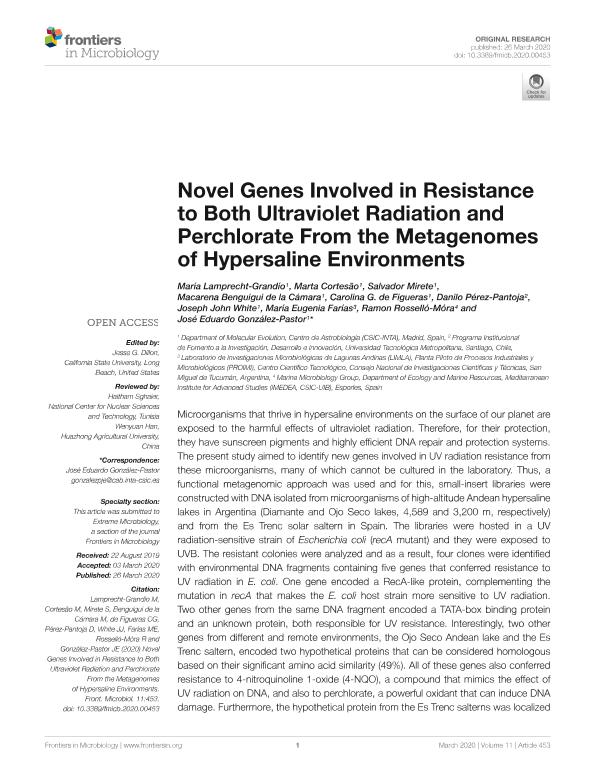Mostrar el registro sencillo del ítem
dc.contributor.author
Lamprecht Grandío, María
dc.contributor.author
Cortesão, Marta
dc.contributor.author
Mirete, Salvador
dc.contributor.author
Benguigui de la Cámara, Macarena
dc.contributor.author
de Figueras, Carolina G.
dc.contributor.author
Pérez Pantoja, Danilo
dc.contributor.author
White, Joseph John
dc.contributor.author
Farias, Maria Eugenia

dc.contributor.author
Rosselló Móra, Ramon
dc.contributor.author
González Pastor, José Eduardo
dc.date.available
2020-08-13T17:05:40Z
dc.date.issued
2020-03
dc.identifier.citation
Lamprecht Grandío, María; Cortesão, Marta; Mirete, Salvador; Benguigui de la Cámara, Macarena; de Figueras, Carolina G.; et al.; Novel Genes Involved in Resistance to Both Ultraviolet Radiation and Perchlorate From the Metagenomes of Hypersaline Environments; Frontiers Media S.A.; Frontiers in Microbiology; 11; 3-2020
dc.identifier.uri
http://hdl.handle.net/11336/111663
dc.description.abstract
Microorganisms that thrive in hypersaline environments on the surface of our planet are exposed to the harmful effects of ultraviolet radiation. Therefore, for their protection, they have sunscreen pigments and highly efficient DNA repair and protection systems. The present study aimed to identify new genes involved in UV radiation resistance from these microorganisms, many of which cannot be cultured in the laboratory. Thus, a functional metagenomic approach was used and for this, small-insert libraries were constructed with DNA isolated from microorganisms of high-altitude Andean hypersaline lakes in Argentina (Diamante and Ojo Seco lakes, 4,589 and 3,200 m, respectively) and from the Es Trenc solar saltern in Spain. The libraries were hosted in a UV radiation-sensitive strain of Escherichia coli (recA mutant) and they were exposed to UVB. The resistant colonies were analyzed and as a result, four clones were identified with environmental DNA fragments containing five genes that conferred resistance to UV radiation in E. coli. One gene encoded a RecA-like protein, complementing the mutation in recA that makes the E. coli host strain more sensitive to UV radiation. Two other genes from the same DNA fragment encoded a TATA-box binding protein and an unknown protein, both responsible for UV resistance. Interestingly, two other genes from different and remote environments, the Ojo Seco Andean lake and the Es Trenc saltern, encoded two hypothetical proteins that can be considered homologous based on their significant amino acid similarity (49%). All of these genes also conferred resistance to 4-nitroquinoline 1-oxide (4-NQO), a compound that mimics the effect of UV radiation on DNA, and also to perchlorate, a powerful oxidant that can induce DNA damage. Furthermore, the hypothetical protein from the Es Trenc salterns was localized as discrete foci possibly associated with damaged sites in the DNA in cells treated with 4-NQO, so it could be involved in the repair of damaged DNA. In summary, novel genes involved in resistance to UV radiation, 4-NQO and perchlorate have been identified in this work and two of them encoding hypothetical proteins that could be involved in DNA damage repair activities not previously described.
dc.format
application/pdf
dc.language.iso
eng
dc.publisher
Frontiers Media S.A.

dc.rights
info:eu-repo/semantics/openAccess
dc.rights.uri
https://creativecommons.org/licenses/by-nc-sa/2.5/ar/
dc.subject
UV
dc.subject
EXTREMOPHILES
dc.subject
ANDEAN LAKES
dc.subject.classification
Biología Celular, Microbiología

dc.subject.classification
Ciencias Biológicas

dc.subject.classification
CIENCIAS NATURALES Y EXACTAS

dc.title
Novel Genes Involved in Resistance to Both Ultraviolet Radiation and Perchlorate From the Metagenomes of Hypersaline Environments
dc.type
info:eu-repo/semantics/article
dc.type
info:ar-repo/semantics/artículo
dc.type
info:eu-repo/semantics/publishedVersion
dc.date.updated
2020-06-23T13:12:07Z
dc.identifier.eissn
1664-302X
dc.journal.volume
11
dc.journal.pais
Reino Unido

dc.description.fil
Fil: Lamprecht Grandío, María. Consejo Superior de Investigaciones Cientificas. Centro de Astrobiologia.; España
dc.description.fil
Fil: Cortesão, Marta. Consejo Superior de Investigaciones Cientificas. Centro de Astrobiologia.; España
dc.description.fil
Fil: Mirete, Salvador. Consejo Superior de Investigaciones Cientificas. Centro de Astrobiologia.; España
dc.description.fil
Fil: Benguigui de la Cámara, Macarena. Consejo Superior de Investigaciones Cientificas. Centro de Astrobiologia.; España
dc.description.fil
Fil: de Figueras, Carolina G.. Consejo Superior de Investigaciones Cientificas. Centro de Astrobiologia.; España
dc.description.fil
Fil: Pérez Pantoja, Danilo. Universidad Tecnológica Metropolitana; España
dc.description.fil
Fil: White, Joseph John. Consejo Superior de Investigaciones Cientificas. Centro de Astrobiologia.; España
dc.description.fil
Fil: Farias, Maria Eugenia. Consejo Nacional de Investigaciones Científicas y Técnicas. Centro Científico Tecnológico Conicet - Tucumán. Planta Piloto de Procesos Industriales Microbiológicos; Argentina
dc.description.fil
Fil: Rosselló Móra, Ramon. Instituto Mediterráneo Estudios Avanzados; España
dc.description.fil
Fil: González Pastor, José Eduardo. Consejo Superior de Investigaciones Cientificas. Centro de Astrobiologia.; España
dc.journal.title
Frontiers in Microbiology
dc.relation.alternativeid
info:eu-repo/semantics/altIdentifier/url/https://www.frontiersin.org/article/10.3389/fmicb.2020.00453/full
dc.relation.alternativeid
info:eu-repo/semantics/altIdentifier/doi/http://dx.doi.org/10.3389/fmicb.2020.00453
dc.relation.alternativeid
info:eu-repo/semantics/altIdentifier/url/https://www.ncbi.nlm.nih.gov/pmc/articles/PMC7135895/
Archivos asociados
